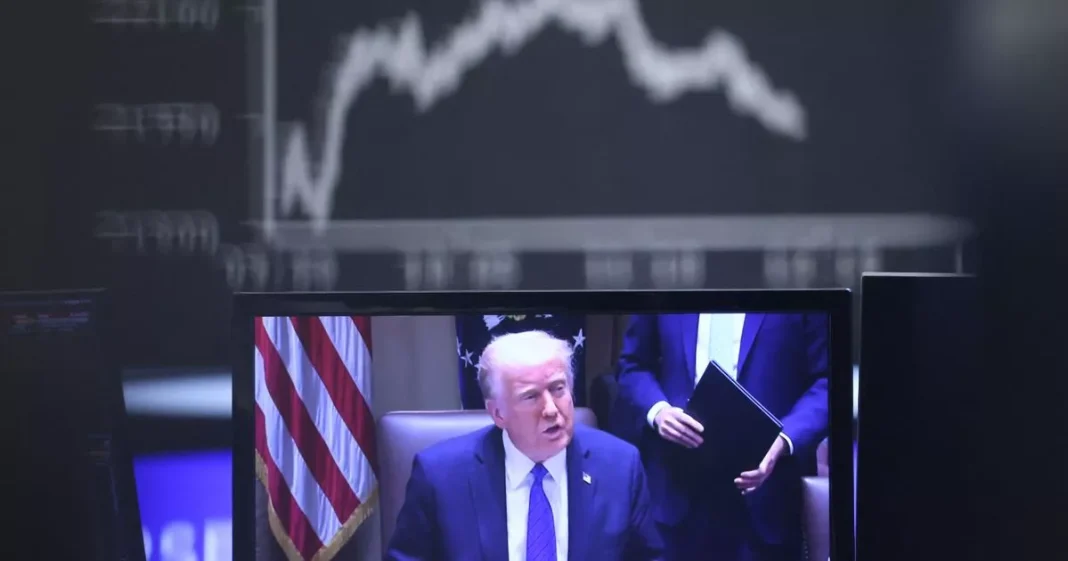The S&P 500 plunged to its 11th worst 3-day drop in history, with figures more dire than those reported during World War 2 and the Covid-19 pandemic. US stocks nosedived at Monday’s open as the fallout from Donald Trump‘s tariffs intensified, sending the stock market index into bear market territory.
The S&P slumped 3.4% having earlier dipped as low as 4% – marking a 20% drop from February’s record high. It comes amid fears the impact of Donald Trump’s shock tariffs on international trade would trigger a global recession. The Nasdaq Index fell 3.9%, while trading volumes surged as Wall Street continued to reel from Friday’s chaotic sell-off. The Dow Jones Industrial Average plummeted 1,191 points, or 3.1%, to 37,123.
Goldman Sachs’ warning of a US recession due to the trade war added to the turmoil, with President Trump showing no signs of backing down. Bloomberg reported Wall Street had lost 13% of its value since Thursday – the third-worst three-day slump on record, trailing only the early days of Covid-19 and the 2008 financial crisis.
Stocks mounted a brief rally which saw the Dow Jones Industrial Average briefly return to positive territory, but losses soon resumed. Investors had hoped for news of successful tariff negotiations over the weekend or a delay to the April 9 deadline for reciprocal tariffs. Instead, Trump downplayed the sell-off, saying: “I don’t want anything to go down, but sometimes you have to take medicine to fix something.”
He added: “We have a trillion-dollar trade deficit with China, hundreds of billions of dollars a year we lose with China. And unless we solve that problem, I’m not going to make a deal.”
The stock market spike came after a report that Kevin Hassett, a top White House economic adviser, said Trump was considering a 90-day pause on tariffs. The susposed remark from Hassett circulated on social media, but no one could pinpoint where it came from even as the market flashed from red to green.
Hassett had spoken to Fox News earlier in the morning, when he was asked about a potential pause. However, he was noncommittal. “I think the president is going to decide what the president is going to decide,” he said.
The episode showed that traders were operating on a hair trigger and eager for any sign of encouraging news for the market. A White House account quickly weighed in on X, calling the report “fake news.”
The market was rattled by the unexpectedly high tariff rates, which appeared to lack a clear economic rationale, and further unsettled by China’s retaliation with a 34% tariff on US imports. Business leaders also appear to have lost confidence, with billionaire investor Bill Ackman warning: “The president is losing the confidence of business leaders around the globe…this is not what we voted for.”
Ackman urged Trump to pause and fix the tariff system, or risk plunging the economy into a “self-induced, economic nuclear winter.” Prime Minister Keir Starmer, responding to the tariffs, said: “Our future is on our hands – we will keep on and fight for the best deal with the United States.”
As tension between the White House and Europe heats up, the Mirror has launched its very own US Politics WhatsApp community where you’ll get all the latest news from across the pond.
We’ll send you the latest breaking updates and exclusives all directly to your phone. Users must download or already have WhatsApp on their phones to join in.
All you have to do to join is click on this link, select ‘Join Chat’ and you’re in! We may also send you stories from other titles across the Reach group.
We will also treat our community members to special offers, promotions, and adverts from us and our partners. If you don’t like our community, you can check out any time you like. To leave our community click on the name at the top of your screen and choose Exit group. If you’re curious, you can read our Privacy Notice.
He insisted he would only strike a deal “if it is in our national interest.” He said the UK government will stick by plans to ban the sale of new petrol and diesel cars, but nnounced rules will be eased around hybrids.
Hybrid cars, which use either a petrol or diesel engine with an electric battery, such as the Toyota Prius and Nissan e-Power, will be allowed to be sold until 2035 to give the industry more time to prepare.
At Reach and across our entities we and our partners use information collected through cookies and other identifiers from your device to improve experience on our site, analyse how it is used and to show personalised advertising. You can opt out of the sale or sharing of your data, at any time clicking the “Do Not Sell or Share my Data” button at the bottom of the webpage. Please note that your preferences are browser specific. Use of our website and any of our services represents your acceptance of the use of cookies and consent to the practices described in our Privacy Notice and Cookie Notice.

